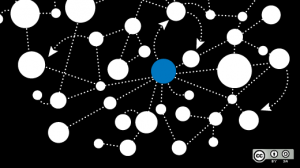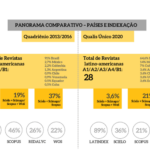By Laura Wilkinson

Image: opensource.com.
Since Crossref was founded in 2000, its member organizations have registered metadata and persistent identifiers (DOIs) for over 100 million content items1. This information is used extensively by the research community—individuals and organizations—who need to find, cite, link and assess research outputs. As a SciELO member, the metadata you provide to Crossref when you register content is key to the discoverability of your journal content.
Over time, Crossref members have requested additional services to help them tackle issues around the originality of content, find out who is citing their publications, help them show updates to content in a persistent way, and more. These services all rely on the metadata that organizations register with Crossref.
Read on to find out more about what these services are, what they do, and why they are important:
- Content Registration is an obligation of Crossref membership, and is the process of depositing your metadata with us (we call it “registering your content”). It may seem obvious, but without it, no Crossref DOIs would exist. The richer the metadata you include, the more discoverable your content becomes. This is because it is made available to numerous systems and organizations that together help credit and cite the work, report the impact of funding, record activity, and track outcomes. You can register XML directly with us via our API, or you can use our web deposit form or our new Metadata Manager tool (beta).
- Reference Linking enables researchers to follow a link from the reference list to other full-text documents, helping them to make connections and discover new things. Reference Linking means adding DOI links to the reference list of each article (or other research objects). Persistent identifiers don’t break (if implemented correctly), and will always lead to the content being looked for, including yours. Reference Linking is an obligation of Crossref membership, because when everyone links their references, research travels further, and everyone benefits.
- Cited-by shows how work has been received by the wider community; displaying the number of times it has been cited, and linking to the citing content. This is done by members providing reference lists as metadata when they register content, which means that you can query the Crossref database to find out where your content is being cited.
A DOI itself is not an indicator of credibility; key indicators of credibility are editorial processes and originality.
- Crossmark gives readers quick and easy access to the current status of an item of content. With one click on the Crossmark button, readers can see if content has been updated, corrected, or retracted.
- Similarity Check is provided by Crossref and powered by iThenticate which helps editors compare the text of submitted papers for similarity, screening for plagiarism, and providing an essential service for checking for originality.
As well as benefiting your journal directly, enhanced metadata contributes to the common good, and increases the visibility of your research publications. Therefore, in addition to registering basic metadata such as date, title, authors, etc, you should provide as much metadata as you can, such as abstracts, license and full text URLs, ORCID iDs, Funder Registry IDs and more, to aid additional discovery and linking points.
How good is your metadata? Use our new Participation Reports tool to find out where you are doing well, and where (and how) your metadata can be improved.
And finally, remember to take care of your metadata. As well as registering additional information for new content, show your backfiles you love them by updating them too. Maintenance is key to making the most of your metadata.
All these services are fuelled by the volume and quality of metadata sent to Crossref. We all play our part to make sure that the metadata we add is complete, clean, high quality, and kept up-to-date. This builds a robust infrastructure which can be searched effectively, and which supports all the services that rely on it.
This blog is the last in a series of five posts from Crossref; we talked more in depth about the role of the DOI, particularly in terms of:
- how DOI and Crossref came to be,
- visibility and interoperability,
- the identification of different content versions of an article such as preprints, formats and languages, and
- options for acquisition.
Note
1. As of the end of September 2018
References
Cited-by [online]. Crossref. 2018 [viewed 3 October 2018]. Available from: https://www.crossref.org/services/cited-by/
Content Registration [online]. Crossref. 2018 [viewed 3 October 2018]. Available from: https://www.crossref.org/services/content-registration/
Crossmark [online]. Crossref. 2018 [viewed 3 October 2018]. Available from: https://www.crossref.org/services/crossmark/
Member obligations [online]. Crossref. 2018 [viewed 3 October 2018]. Available from: https://www.crossref.org/member-obligations/
Reference Linking [online]. Crossref. 2018 [viewed 3 October 2018]. Available from: https://www.crossref.org/services/reference-linking/
Similarity Check [online]. Crossref. 2018 [viewed 3 October 2018]. Available from: https://www.crossref.org/services/similarity-check/
WILKINSON, L.J. The critical role of the DOI [online]. SciELO in Perspective, 2018 [viewed 03 October 2018]. Available from: https://blog.scielo.org/en/2018/08/02/the-critical-role-of-the-doi/
WOOD, C.C. Why Crossref exists and persists [online]. SciELO in Perspective, 2018 [viewed 03 October 2018]. Available from: https://blog.scielo.org/en/2018/07/17/why-crossref-exists-and-persists/
External links
Crossref Dashboard <https://www.crossref.org/dashboard/>
Ithenticate <http://www.ithenticate.com/>
Laura J. Wilkinson <https://orcid.org/0000-0002-8922-7839>
Metadata Manager <https://www.crossref.org/metadatamanager/>
ORCID <https://orcid.org/>
About Laura J. Wilkinson
Laura J. Wilkinson is Crossref’s Education Manager, designing and delivering our education strategy to maximise members’ understanding of and participation in Crossref. Her previous experience includes education and outreach at ORCID, roles in academic libraries from e-resources management to law librarian, and being a science teacher.
Como citar este post [ISO 690/2010]:


















Recent Comments